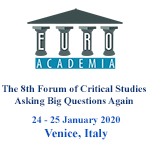Euroacademia Conferences
 Europe Inside-Out: Europe and Europeanness Exposed to Plural Observers (9th Edition) April 24 - 25, 2020
Europe Inside-Out: Europe and Europeanness Exposed to Plural Observers (9th Edition) April 24 - 25, 2020 Identities and Identifications: Politicized Uses of Collective Identities (9th Edition) June 12 - 13, 2020
Identities and Identifications: Politicized Uses of Collective Identities (9th Edition) June 12 - 13, 2020 8th Forum of Critical Studies: Asking Big Questions Again January 24 - 25, 2020
8th Forum of Critical Studies: Asking Big Questions Again January 24 - 25, 2020 Re-Inventing Eastern Europe (7th Edition) December 13 - 14, 2019
Re-Inventing Eastern Europe (7th Edition) December 13 - 14, 2019 The European Union and the Politicization of Europe (8th Edition) October 25 - 26, 2019
The European Union and the Politicization of Europe (8th Edition) October 25 - 26, 2019 Identities and Identifications: Politicized Uses of Collective Identities (8th Edition) June 28 - 29, 2019
Identities and Identifications: Politicized Uses of Collective Identities (8th Edition) June 28 - 29, 2019 The European Union and the Politicization of Europe (7th Edition) January 25 - 26, 2019
The European Union and the Politicization of Europe (7th Edition) January 25 - 26, 2019 7th Forum of Critical Studies: Asking Big Questions Again November 23 - 24, 2018
7th Forum of Critical Studies: Asking Big Questions Again November 23 - 24, 2018 Europe Inside-Out: Europe and Europeanness Exposed to Plural Observers (8th Edition) September 28 - 30, 2018
Europe Inside-Out: Europe and Europeanness Exposed to Plural Observers (8th Edition) September 28 - 30, 2018 Identities and Identifications: Politicized Uses of Collective Identities (7th Edition) June 14 - 15, 2018
Identities and Identifications: Politicized Uses of Collective Identities (7th Edition) June 14 - 15, 2018
European (Dis)Union: Revisiting Theory
-
-

-
Presentation speakers
- Mila Marinova Temnyalova, The George Washington University, Washington, USA
Abstract:
I study whether the phenomenon of European disintegration can be explained within the framework of three theories of integration – neofunctionalism, liberal intergovernmentalism, and multi-level governance. I revisit primary scholarship, analyze each theory’s basic assumptions, and examine the scholars’ original claims to test whether these theories have the capacity to explain the process of disintegration within the EU. In addition, I run each theory’s basic assumptions behind integration in reverse in order to propose what each theory may view as a disintegrative process and identify the causal mechanisms behind one such process. I hypothesize that while these theories were originally created to explain integration with single directionality, their frameworks may also be used to account for disintegration to various extent, depending on the theory being tested. This is largely due to the multi-dimensional nature of the EU, which is not only a political and economic union, but also a social and cultural one. Given the complexity of the EU, I consider integration and disintegration as processes that occur simultaneously in separate domains. With the 21st century challenges faced by the EU, I propose a more interdisciplinary approach to the study of integration and disintegration, including more nuanced definitions and assumptions.
-
Related Presentations













